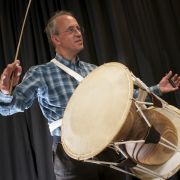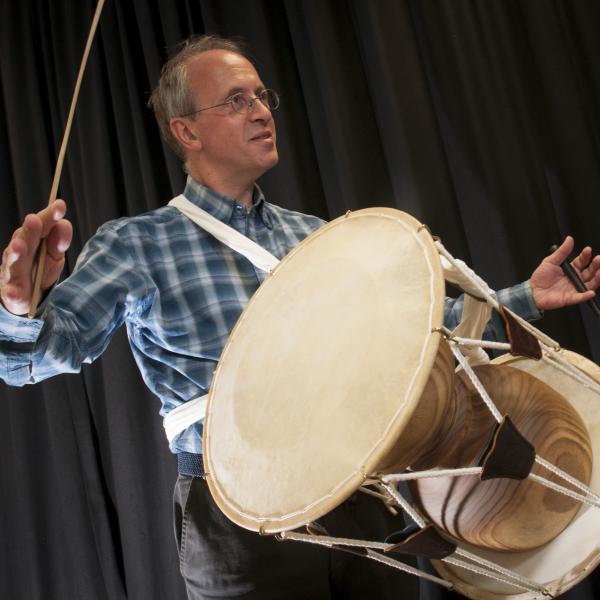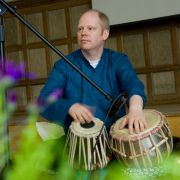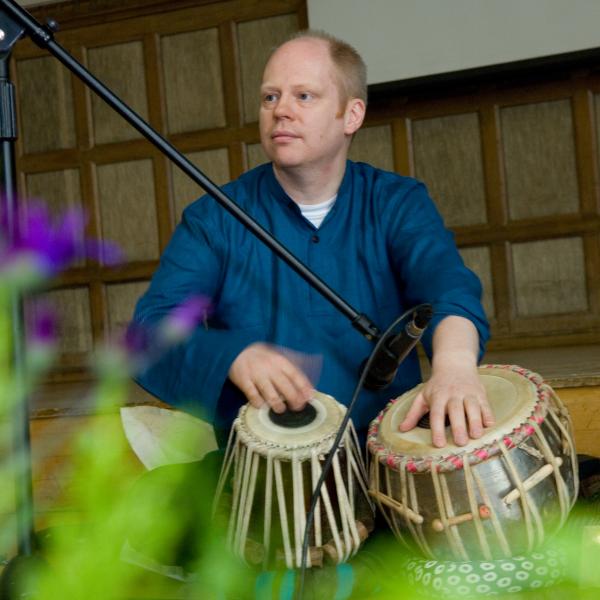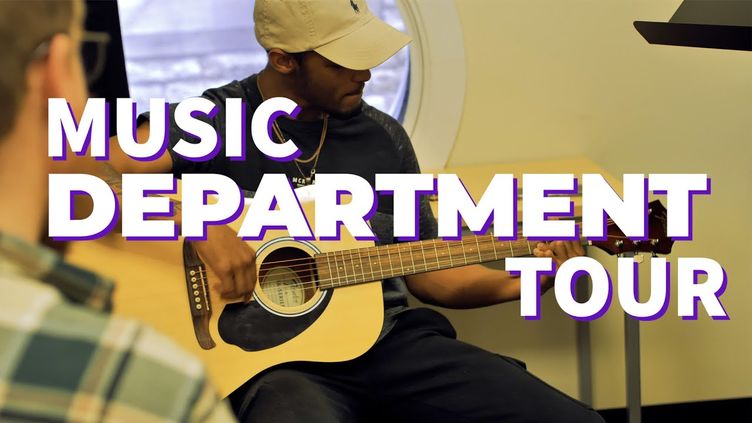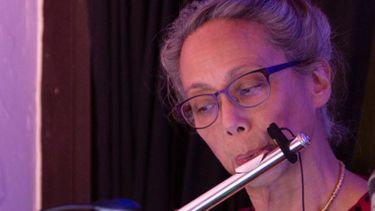Explore this course:
Transcultural and Traditional Music Studies
Department of Music,
Faculty of Arts and Humanities
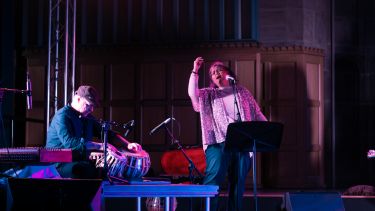
Course description
World music studies encompasses the study of any and all musical activity in the world: Western as well as ‘exotic’, popular as well as classical, amateur as well as professional.
The course allows you to specialise in an area of your choice, while providing the opportunity to study musical phenomena from a global perspective.
Some students take advantage of Sheffield’s position as a major hub of both English and ‘Celtic’ musical activity to pursue in-depth studies on traditional musics of the British Isles. Others enjoy the opportunity to develop new understanding of musical sounds, practices and cultures from elsewhere in the world.
In this course, ‘world music’ is interpreted quite literally as encompassing, in principle, the study of any and all musical activity in the world: Western as well as ‘exotic’, popular as well as classical, amateur as well as professional.
Traditional and world musics and their associated cultures are studied through practical methods such as fieldwork and direct participation in music-making, as well as library research and theoretical interpretation.
You'll gain both a deeper knowledge of the music and a set of skills for discovering and communicating new knowledge about music.
Modules
First year
- Research Skills
-
This unit provides essential research and study skills necessary for successful completion of the MA in World Music Studies as a whole (bibliographic skills and accessing web resources; editing and revision skills; style sheets; music processing; note-taking and essay planning). It begins with one residential, which includes practical instruction in lectures, seminars and demonstration in several skills, covering both effective music research and efficient distance learning. A series of e-tutorials accompanied by skill-based work-sheets completes the tution element. Successful completion of the unit requires satisfactory completion of a series of academic study tasks.
15 credits - Music of the World
-
The unit provides a foundation in the study of music from significant traditions from each continent. It begins with one residential, which includes practical workshops in several musical studies, lectures and seminars, plus a series of e-tutorials. The remainder of the unit is taught through listening- and reading-based self study, leading to an essay on one musical tradition, a sample transcription or analysis with commentary and an annotated bibliography of sources for further research.
30 credits - Anglo and Celtic Traditions
-
This unit cultivates a broad acquaintance with several contrasting musical traditions of the British Isles and a deeper knowledge of at least one of them. It also provides a foundation in a variety of approaches to the study of traditional music. It begins with the first residential, which includes practical workshops in several musical styles as well as lectures and seminars. The remainder of the unit is taught through listening- and reading-based self study, e-tutorials and participation in an online discussion forum, leading to an essay on one musical tradition, a sample transcription or analysis with commentary and an annotated bibliography of sources for further research.
30 credits - Case Studies in Ethnomusicology
-
The module focuses on analysis of selected key texts in ethnomusicology (e.g. Blacking, 'How Musical is Man?'; Lortat-Jacob, 'Sardinian Chronicles'; Berliner, 'Soul of Mbira'). Lectures during the residential will introduce the history of ethnomusicology as a discipline. Study of the three books will be supported by guidance sheets keyed to each chapter and e-tutorials. Assessment is by completion of a book review (c. 3,000 words) on any one of the three books.
15 credits - Approaches to Fieldwork
-
Introduction to designing an independent field project consisting of supervised fieldwork exercises (held in Sheffield during the residential) and subsequent self-study (supported by e-tutorials) and a programme of assisted readings. Initial instruction will cover project design, participant-observation methodology, ethical issues and use of recording technology. Assessed through a written project of three parts: 1) fieldnotes diary (c. 2,000 words); ii) sample recording with commentary (c. 10 minutes of music and up to 1,000 words); iii) essay reflecting on one selected issue, either within the tradition observed or on fieldwork more generally (c. 2,000 words).
30 credits
Second year
- Teaching and Transmission
-
Taught at the beginning of the second year in the two-year part-time distance learning MA programme, Traditional and World Music, the unit builds on general knowledge and research skills established in the first year to explore an issue at the heart of all traditional music. With guidance provided through lectures at the summer residential, online study materials and e-tutorials, students pursue individual study projects on aspects of the teaching and transmission of music, leading to assessed work in the format of either an essay, a radio programme or a folio of teaching or research materials. The unit replaces MUS6006 Special Topic in World Music, reducing the choice of three topics offered in that module to a single shared topic for the sake of efficiency and increased dialogue between students, while keeping the flexibility of assessment formats to accommodate varying student interests.
30 credits - Dissertation
-
The unit provides the final element in the MA in Traditional and World Music, by distance learning. It comprises a library- or fieldwork-based dissertation of c. 15,000 words requiring original investigation and research by the student on a topic within the area of world music approved by the unit tutor. Original field materials may be submitted as appendices to the dissertation. Learning is supported by original research, seminars and tutorials at the planning stages, and by e-tutorials during writing up.
60 credits
The content of our courses is reviewed annually to make sure it's up-to-date and relevant. Individual modules are occasionally updated or withdrawn. This is in response to discoveries through our world-leading research; funding changes; professional accreditation requirements; student or employer feedback; outcomes of reviews; and variations in staff or student numbers. In the event of any change we'll consult and inform students in good time and take reasonable steps to minimise disruption.
Duration
2 years part-time by distance learning
Teaching
Doing a distance learning course means that most of the teaching takes place through the University online portals. You'll have access to the modular course materials, library services, class discussion boards and other online resources.
The ability to work independently is important for an online course and the modules, assignments and tutorials are designed to help you to develop the necessary skills.
Throughout the course, you’ll be supported by your tutor via email and online meetings.
You’ll also have opportunities for tuition by members of the University’s Psychology of Music team and peer interaction during the annual summer school.
- Learn more about your supervisors
-
Changes to the teaching staff on the programme are possible, but are likely to include:
Annual summer schools
The annual summer schools are an important part of this course.
By attending them, you'll have opportunities to interact with your tutors and peers, and to participate in lectures on the main course topics, academic skills and research methods.
The summer schools include introductory sessions on modular material, using the University’s online systems, developing your study skills, exploring the literature, and evaluating and using research methods.
There are also opportunities to participate in interactive seminars, discussion groups and tutorials, and workshop your individual projects.
Attending the summer school is an intensive experience as we cover a lot of material, but feedback from our distance learners has shown that they enjoy the chance to fully immerse themselves in the course.
Due to the restrictions associated with the pandemic, the summer school has been entirely online in recent years. However, the format of the summer school is under regular review, and a return to an onsite format will be considered at a future date.
Assessment
Assessments take a variety of forms such as reports and essays, fieldnotes and recordings, and a final dissertation or folio.
In the second year, you'll carry out an original research project on which you will base your written dissertation.
Department
Department of Music
Our department ethos combines high achievement with a sense of community and a shared passion for music. Our internationally recognised research informs our high-quality teaching and our student experience is collaborative, supportive and inspiring.
Sheffield is celebrated as one of the UK's leading music cities, with dozens of major venues from the City Hall and Crucible to Yellow Arch Studios and the Foundry, covering all music genres. This brings with it a host of opportunities for our students to get involved in professional music-making of the highest quality.
We work closely with the University's Concerts Series and oversee ensembles such as the Symphony and Chamber Orchestras, the Chamber Choir and the Folk Group, so our MA students have the opportunity to perform and develop ensemble skills with their peers.
Entry requirements
2:1 undergraduate degree. If your undergraduate degree is not in music, you’ll need to provide evidence of substantial engagement with music.
We also recognise the value of experience, and may accept applications from people who have been in practice, or who bring other experience to their studies.
Overall IELTS score of 6.5 with a minimum of 6.0 in each component, or equivalent.
If you have any questions about entry requirements, please contact the department.
Fees and funding
Apply
Applications for this course open in September 2024.
Contact
music-admissions@sheffield.ac.uk
+44 114 222 0495
Any supervisors and research areas listed are indicative and may change before the start of the course.
Recognition of professional qualifications: from 1 January 2021, in order to have any UK professional qualifications recognised for work in an EU country across a number of regulated and other professions you need to apply to the host country for recognition. Read information from the UK government and the EU Regulated Professions Database.

